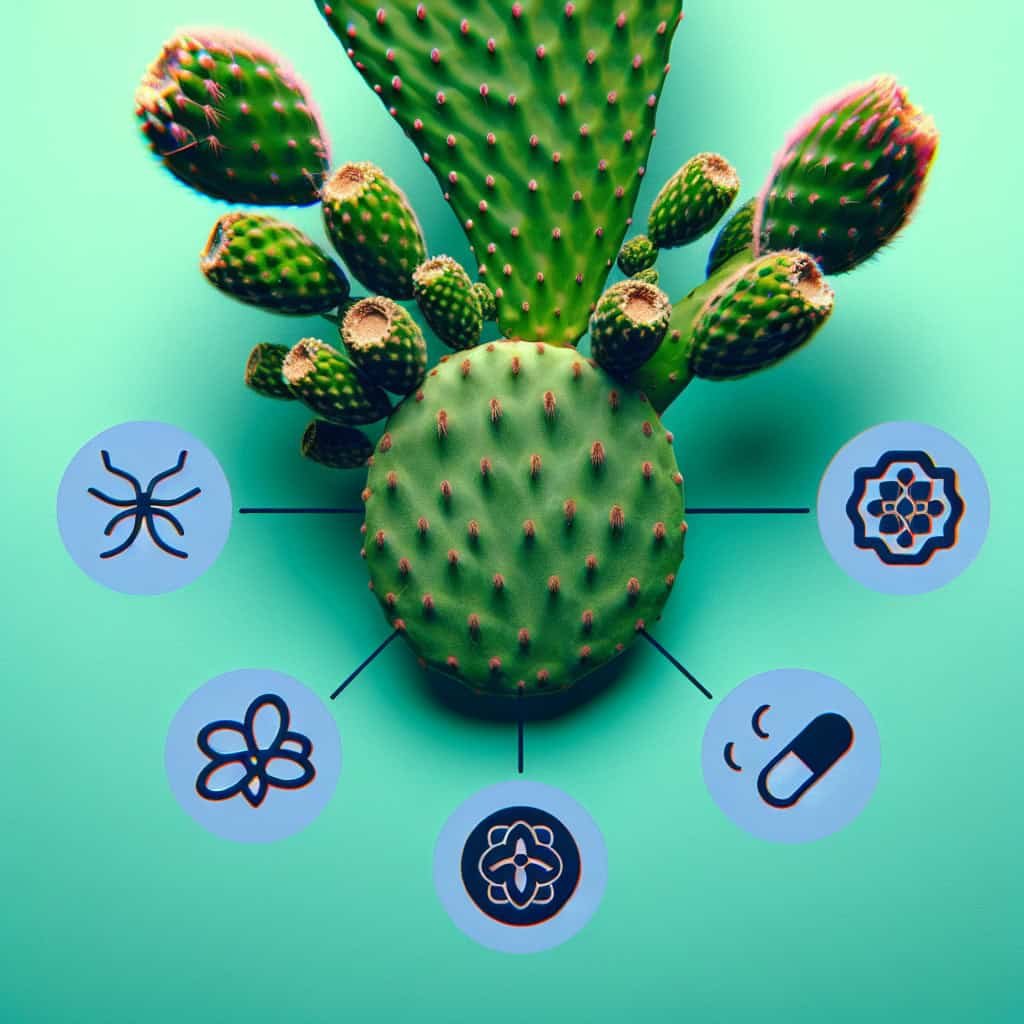If you’re someone who suffers from allergies, you may have wondered whether it’s safe to take nopal supplements. Nopal, also known as prickly pear cactus, has gained popularity in recent years for its potential health benefits. However, for individuals with allergies, it’s important to know whether nopal supplements can trigger any adverse reactions. In this article, we will explore the compatibility of nopal supplements with allergies and provide valuable insights for those seeking a reliable answer. So, let’s delve into the details and find out if nopal supplements are suitable for individuals with allergies.

Understanding Nopal Supplements
What are Nopal Supplements?
Nopal supplements are dietary supplements that incorporate the extract or powder derived from the pads of the nopal cactus, also known as prickly pear cactus. This versatile plant has been used for centuries in traditional medicine, particularly in Mexican and South American cultures. Nopal supplements are consumed for their potential health benefits and are often marketed as a natural remedy for various conditions.
Health Benefits of Nopal Supplements
Nopal supplements have gained popularity due to their perceived health benefits. They are believed to be rich in vitamins, minerals, antioxidants, and fiber, making them potentially beneficial for overall health. Some of the commonly promoted benefits of nopal supplements include improved digestion, reduced inflammation, blood sugar regulation, cholesterol management, and even weight loss. However, it is essential to note that scientific research on the effectiveness of nopal supplements is limited, and these claims are not backed by substantial evidence.
Types of Allergies
Common Allergies
Allergies are a common immune response to certain substances that are harmless for most people but trigger adverse reactions in individuals with allergies. Some of the most prevalent allergies include pollen, dust mites, pet dander, insect bites, and certain foods. Allergic reactions can vary in severity, ranging from mild symptoms like sneezing and itching to more severe reactions such as difficulty breathing or anaphylaxis.
Possible Allergic Reactions to Nopal
While nopal cactus is not a typical allergenic substance, some individuals may develop allergic reactions to nopal supplements. Allergic reactions to nopal can manifest in various ways, including skin rash, itching, hives, swelling, nasal congestion, watery eyes, or even gastrointestinal symptoms like nausea or diarrhea. It is essential to be aware of these potential allergic reactions if you are considering taking nopal supplements, especially if you have a history of allergies.
Caution for Allergy Sufferers
Consulting a Healthcare Professional
If you have known allergies or suspect that you may be allergic to certain substances, it is crucial to consult a healthcare professional before starting any new dietary supplement, including nopal supplements. A healthcare provider can assess your medical history, evaluate the potential risks, and provide personalized recommendations based on your specific circumstances. They can help determine if nopal supplements are safe for you or if there are alternative options that may better suit your needs.
Reading Supplement Labels
When considering nopal supplements, it is essential to carefully read the supplement labels. Look for any potential allergens or ingredients that you may be sensitive to. Some supplements may contain additional substances, such as fillers or binders, that could trigger allergic reactions. If you have any doubts or questions about the ingredients listed on the label, consult with a healthcare professional or a pharmacist.
Potential Cross-Reactivity with Other Allergens
Cross-reactivity occurs when the proteins in one substance are similar to those in another substance, leading to an allergic reaction to both substances. Although the likelihood of cross-reactivity between nopal and common allergens is relatively low, individuals with allergies to related plants such as cacti or birch pollen should exercise caution. If you have known allergies to similar substances, it is advisable to consult a healthcare professional before introducing nopal supplements into your routine.
Factors to Consider
Severity of Allergy
The severity of your allergies plays an important role in determining whether it is safe for you to consume nopal supplements. If your allergies are mild and non-life-threatening, the risk of experiencing a severe reaction to nopal supplements is relatively low. However, if you have a history of severe allergic reactions or anaphylaxis, it is crucial to approach nopal supplements with caution and consult a healthcare professional before considering their use.
Individual Sensitivity
Each person’s sensitivity to allergens can vary. While nopal supplements may trigger allergic reactions in some individuals, others may tolerate them without any adverse effects. If you have previously consumed foods derived from the nopal cactus, such as prickly pear fruit, and did not experience any allergic reactions, it may indicate a lower risk of developing allergies to nopal supplements. Nonetheless, it is always prudent to be cautious and monitor your body’s responses when trying any new supplement.
Dosage and Formulation
The dosage and formulation of nopal supplements can also impact the likelihood of experiencing allergic reactions. Some individuals may have a higher tolerance for lower dosages, while others may only react to higher concentrations of the active compounds present in the supplement. Additionally, the formulation of the supplement, including any added ingredients or potential contaminants, can influence its allergenicity. It is advisable to start with a low dosage of nopal supplements and gradually increase it while closely observing any allergic symptoms.

Research and Studies
Limited Research on Nopal Allergenicity
Currently, there is limited scientific research specifically evaluating the allergenicity of nopal supplements. Most studies have focused on the nutritional profile and potential health benefits of nopal, rather than investigating its allergic potential. This lack of research makes it challenging to definitively determine the prevalence and severity of nopal allergies. As a result, it is advisable to approach nopal supplements with caution and be aware of any potential allergic reactions.
Case Studies and Allergic Reactions
Despite the limited research, several case studies have reported allergic reactions to nopal and its derivatives. These case studies highlight the importance of individual variations in sensitivity and the potential risks associated with nopal supplements. Allergic reactions ranged from mild symptoms such as skin rashes and hives to more severe manifestations, including difficulty breathing and anaphylactic shock. While rare, these cases emphasize the need for individuals with allergies to exercise caution and seek medical advice before consuming nopal supplements.
Alternative Options
Looking for Nopales in Natural Form
If you are concerned about potential allergic reactions to nopal supplements or prefer to consume whole foods, considering incorporating nopales in their natural form may be an alternative option. Nopales can be found in many grocery stores or farmers’ markets, typically in the produce section. They can be cooked in various ways, such as grilling, sautéing, or boiling, and added to dishes like salads, stir-fries, or tacos. By consuming nopales in their natural form, you can still benefit from their nutritional value while minimizing the potential risks associated with supplements.
Considering Other Nutritional Supplements
If nopal supplements are not suitable for you due to allergies or other concerns, there are various alternative nutritional supplements available in the market. For example, if you are seeking additional fiber in your diet, psyllium husk or chia seeds can offer similar benefits. Similarly, if you are looking for antioxidant support, options like vitamin C or green tea extract may be suitable alternatives. It is essential to consult with a healthcare professional or a registered dietitian to determine which supplements are most appropriate for your individual needs.

Guidelines for Safe Consumption
Starting with Small Doses
When considering nopal supplements, it is recommended to start with a small dosage and gradually increase it if no adverse reactions occur. By starting with a low dose, you can gauge your body’s tolerance and observe any potential allergic symptoms without subjecting yourself to a high concentration of the supplement’s active compounds. This cautious approach allows you to make informed decisions about whether nopal supplements are suitable for you.
Monitoring for Any Adverse Reactions
During the initial consumption and subsequent use of nopal supplements, it is important to closely monitor your body for any adverse reactions. Pay attention to any changes in your skin, respiratory system, digestive system, or overall well-being. If you experience any unusual symptoms, such as itching, swelling, difficulty breathing, or gastrointestinal disturbances, discontinue use and seek medical attention promptly.
Discontinuing Use if Allergic Symptoms Appear
If you develop any allergic symptoms after consuming nopal supplements, it is advisable to discontinue their use immediately. Allergic reactions can range from mild discomfort to life-threatening situations, so it is crucial to prioritize your well-being. Consult with a healthcare professional to discuss your symptoms, obtain appropriate medical advice, and explore alternative options.
Labeling and Certification
Certified Allergen-Free Nopal Supplements
To ensure the safety of individuals with allergies, some manufacturers may offer certified allergen-free nopal supplements. These supplements undergo rigorous testing to verify that they do not contain allergenic substances or contaminants that could trigger allergic reactions. Look for certifications or seals indicating that the product has been tested and verified as allergen-free by reputable organizations or regulatory bodies. However, it is still advisable to consult with a healthcare professional to determine if these certified supplements are suitable for your specific allergies.
Reading and Understanding Labels
Sufficient knowledge of reading supplement labels is crucial to identify potential allergenic substances or other ingredients that could trigger allergic reactions. Familiarize yourself with the names of common allergens and carefully review the ingredient list for any substances you are sensitive to. If you are unsure about whether a particular ingredient is safe for you, consult with a healthcare professional or a registered dietitian who can provide guidance.

Interactions with Medications
Consulting a Healthcare Provider
If you are taking any medications, including allergy medications, it is essential to consult with a healthcare provider before starting nopal supplements. Certain medications may interact with the active compounds found in nopal, potentially affecting their efficacy or causing adverse effects. A healthcare professional can evaluate the safety of combining nopal supplements with your current medications and provide personalized advice based on your medical needs.
Potential Interactions with Allergy Medications
Specific interactions may occur between nopal supplements and allergy medications such as antihistamines or corticosteroids. Nopal extracts contain bioactive components that may enhance or inhibit the effects of these medications. Additionally, nopal supplements could potentially amplify drowsiness or other side effects associated with allergy medications. It is crucial to inform your healthcare provider about all medications you are taking to ensure a comprehensive assessment of potential interactions.
Conclusion
Nopal supplements can offer potential health benefits, but individuals with allergies should approach them with caution. While nopal allergies are not common, allergic reactions have been reported in some cases. Consulting a healthcare professional, carefully reading supplement labels, and considering alternative options such as consuming nopales in their natural form are essential for individuals with allergies. It is crucial to closely monitor for any adverse reactions and discontinue use if any symptoms of allergic reactions appear. Personal responsibility and individual choices play a vital role in managing allergies and making informed decisions regarding the use of nopal supplements or other nutritional supplements. Remember that the safety and well-being of individuals with allergies should always be the top priority.

